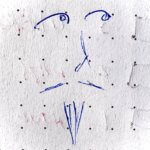Shakespeare References
First French Lord Dumaine:
“The web of our life is of a mingled yarn, good and ill together: our virtues would be proud, if our faults whipt them not, and our crimes would despair, if they were not cherish’d by our virtues.”
Enter a Messenger.
“How now? Where’s your master?”
Shakespeare’s All’s Well That Ends Well (IV.iii.27-8)
Shakespeare References
 Over the years, I’ve used a number Shakespeare References in my works. Currently, and looking ahead to baseball and other summer adventures, three — largely academic — references stand out. These are my current sources when trying to explicate or deconstruct pieces and parts in one of the plays.
Over the years, I’ve used a number Shakespeare References in my works. Currently, and looking ahead to baseball and other summer adventures, three — largely academic — references stand out. These are my current sources when trying to explicate or deconstruct pieces and parts in one of the plays.
• This is Shakespeare by Emma Smith
• Shakespeare After All by Majorie Garber
• Shakespeare: The Invention of Human by Harold Bloom
When I had time to burn on the commute to and from Austin? I faithfully listened to a remarkable podcast, the always wonderful Chop Bard. Thought-provoking, excellent presentation, deep dives on certain influences, and basically, just a clean version of the material.
That podcast is largely even-handed, not straying too far in any one direction, merely a critical dissection of the individual parts, and then an overview about how those various pieces all held together to form a dramatic whole. Historical, historicity, linguistic, and possible root sources, classical.
Accompanied, as I am these days, the commute is less about drama and more about music with baseball games taking up some of my airwaves.
Shakespeare References
What’s most amusing about my Shakespeare references is the way I got to the number one on the list, Emma Smith’s This is Shakespeare. Started with working at the rock shop, and from there, listening to the plays read aloud, then dramatically read aloud, and then, a podcast that was a single lecture about a single element in Shakespeare’s works, and eventually, I stumbled through her lecture series delivered as podcasts.
Each lecture was about a play, and then, taking what seemed like a central thematic element, or particular point, and looking at that, paying attention to the lens with which the critical structure is examined, and that makes all the difference.
It gives way to a critical thinking, and how I think about a certain situation, whether that is political, astrological, or mundane.
Shakespeare References
There’s a final point of reference, and one that comes up more frequently: the World Wide Web.
Annoying that it might be, the ubiquitous search functions, and the abundance of material available, just makes it a resource.
There’s a lot of good stuff, but sifting through that material is sometimes disheartening. One news story, unrelated, I looked for a headline snippet, and found that the same article was repeated, over and over, with no new material added. Same story, repeated. Looked factual, but then, I was trying to find dissenting views, counterpoints, and other possible interpretations. All I got was the same news bytes, copied and pasted, over and over. Maybe just read in from a news feed.
Just because it gets repeated, over and over, that doesn’t make it true.
Tales about Shakespeare, and the Shakespeare academic apocrypha lives on. Which is why I like, on some days, just a book that holds the data.
But the quote suggests that even Shakespeare foresaw the coming of the World Wide Web: “The web of our life is of a mingled yarn, good and ill together…”
Shakespeare References
About This is Shakespeare link •
About Shakespeare After All link •
About Shakespeare Enriching Life •